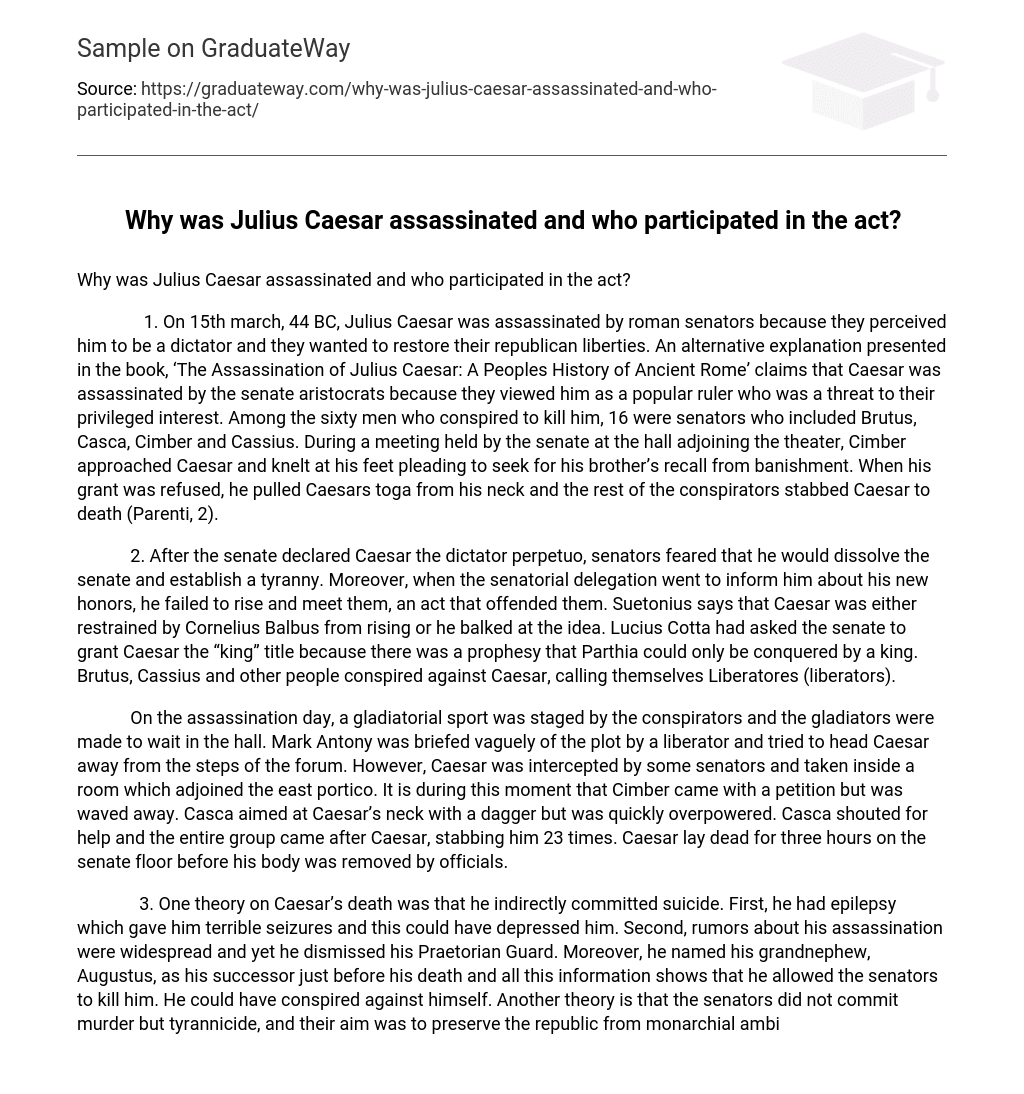1. On 15th march, 44 BC, Julius Caesar was assassinated by roman senators because they perceived him to be a dictator and they wanted to restore their republican liberties. An alternative explanation presented in the book, ‘The Assassination of Julius Caesar: A Peoples History of Ancient Rome’ claims that Caesar was assassinated by the senate aristocrats because they viewed him as a popular ruler who was a threat to their privileged interest. Among the sixty men who conspired to kill him, 16 were senators who included Brutus, Casca, Cimber and Cassius. During a meeting held by the senate at the hall adjoining the theater, Cimber approached Caesar and knelt at his feet pleading to seek for his brother’s recall from banishment. When his grant was refused, he pulled Caesars toga from his neck and the rest of the conspirators stabbed Caesar to death (Parenti, 2).
2. After the senate declared Caesar the dictator perpetuo, senators feared that he would dissolve the senate and establish a tyranny. Moreover, when the senatorial delegation went to inform him about his new honors, he failed to rise and meet them, an act that offended them. Suetonius says that Caesar was either restrained by Cornelius Balbus from rising or he balked at the idea. Lucius Cotta had asked the senate to grant Caesar the “king” title because there was a prophesy that Parthia could only be conquered by a king. Brutus, Cassius and other people conspired against Caesar, calling themselves Liberatores (liberators).
On the assassination day, a gladiatorial sport was staged by the conspirators and the gladiators were made to wait in the hall. Mark Antony was briefed vaguely of the plot by a liberator and tried to head Caesar away from the steps of the forum. However, Caesar was intercepted by some senators and taken inside a room which adjoined the east portico. It is during this moment that Cimber came with a petition but was waved away. Casca aimed at Caesar’s neck with a dagger but was quickly overpowered. Casca shouted for help and the entire group came after Caesar, stabbing him 23 times. Caesar lay dead for three hours on the senate floor before his body was removed by officials.
3. One theory on Caesar’s death was that he indirectly committed suicide. First, he had epilepsy which gave him terrible seizures and this could have depressed him. Second, rumors about his assassination were widespread and yet he dismissed his Praetorian Guard. Moreover, he named his grandnephew, Augustus, as his successor just before his death and all this information shows that he allowed the senators to kill him. He could have conspired against himself. Another theory is that the senators did not commit murder but tyrannicide, and their aim was to preserve the republic from monarchial ambitions of Caesar. To add on, Caesar was unable to identify his secondary enemies after he had killed his primary enemies. As a brave military leader, he was able to raid and capture many territories, destroying his enemies but his own allies turned against him because of jealous (Katyal,13).
4. I believe that the senators assassinated Caesar because they were jealous of his achievements. Being a successful and popular leader, the senators became jealous and wanted to safeguard their own interest. They started to spread ideological and personal propaganda concerning kingship but all this were malice aimed at assassinating him.
Works Cited
Parenti, M. Why Caesar Was Really Killed. 2003. Viewed 9 August 2010 from <http://hnn.us/articles/1643.html>
Katyal, N. Conspiracy Theory. Yale Law Review. Vol. 112, p. 12-15, 2003





